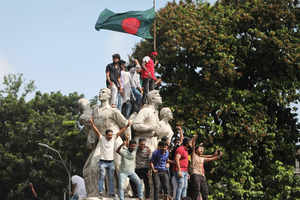

New Delhi, Nov 9 (IANS) In a bombshell interview that’s sending shockwaves through South Asian diplomatic circles, a key ally of ousted Prime Minister Sheikh Hasina has unleashed a torrent of accusations, painting the 2024 Bangladesh uprising as a meticulously orchestrated Western plot.
Mohibul Hasan Chowdhury, Hasina’s former shipping minister and crisis negotiator, alleged that the United States Agency for International Development (USAID)—once the US government’s sprawling humanitarian powerhouse—and the influential Clinton family pulled the strings behind the student-led protests that toppled Hasina’s 15-year reign, NDTV has reported, referring to an exclusive published by ‘Russia Today’.
Chowdhury didn’t mince words, branding the chaos a “carefully planned” regime-change operation fuelled by shadowy NGO funding, the NDTV report said.
“Certain actions of some NGOs, especially from the US—I mean USAID, or the International Republican Institute—were running campaigns against our government since 2018,” he charged, claiming millions in USAID dollars vanished into “clandestine” channels to stoke unrest.
The ex-minister zeroed in on a “nexus” between the Clintons and interim chief Muhammad Yunus, the Nobel-winning microfinance pioneer now steering Bangladesh’s transitional ship.
“This relationship reflects a deeper attempt by the Clinton Foundation and Yunus to push for regime change under the guise of democracy and development,” Chowdhury asserted, tying it to Hasina’s refusal to bow to US pressures—like rejecting demands for a military foothold on strategic St Martin’s Island, a Bay of Bengal gem her father, independence hero Sheikh Mujibur Rahman, once defended.
The interview revives Hasina’s own post-exile broadsides, where she lambasted Yunus for “selling the nation to the US”, fleeing Dhaka on August 5, 2024, amid a mob’s rampage at her Ganabhaban residence, Hasina touched down in Delhi, where she remains under India’s protective wing.
The July-August inferno, sparked by job quota fury, claimed at least 700 lives and unleashed pogroms against Hindu minorities—scars that linger as Yunus’s regime pivots toward Pakistan, the very foe accused of 1971’s genocide that birthed Bangladesh.
Washington, predictably, swatted down the narrative as “laughable” and “simply false.”
Back in August 2024, White House Press Secretary Karine Jean-Pierre and State Department deputy Vedant Patel dismissed similar whispers from Hasina’s camp as disinformation, insisting the uprising was a homegrown roar against corruption and inequality.
US experts like Michael Kugelman of the Wilson Centre echoed this, citing “no plausible evidence” of meddling.
Critics decry the claims as sour grapes from a fallen regime, but they fuel a narrative of neo-colonial intrigue in the Global South.
As Yunus’s interim setup eyes early polls, the spectre of foreign fingerprints looms large, threatening to fracture Bangladesh’s fragile peace.
Hasina’s Awami League, banned from contests, mulls independent runs, vowing a comeback. For now, the Clinton-Yunus “nexus” remains an allegation, not an indictment—but in Dhaka’s tinderbox, whispers can ignite wildfires.
–IANS
sktr/uk
